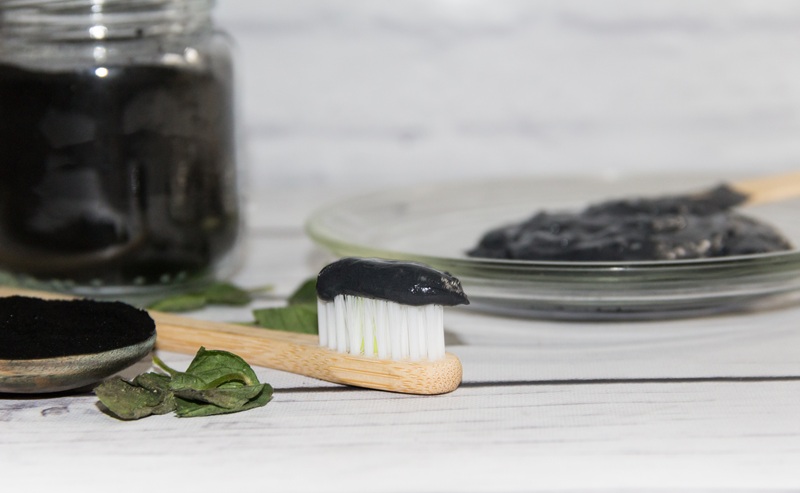Charcoal Toothpaste: A Dentist’s Opinion on This Trendy Toothpaste

In recent years, charcoal toothpaste has exploded in popularity, and have likely seen it on supermarket shelves, social media, telly commercials or recommended by influencers claiming it’s the secret to a brighter, whiter smile. But does charcoal toothpaste work? Or is it just another flashy product that does not deliver on its promises?
As dentists, we hear a lot of questions from patients about new trends in oral care, and this includes using charcoal toothpaste. So in this blog, we will break down what charcoal toothpaste really is, what it claims to do, the effects of it when used and whether it’s truly worth adding to your brushing routine.
What Is Charcoal Toothpaste?
Charcoal toothpaste is made with charcoal, a fine black powder that is typically made from coconut shells, wood, or other natural materials processed at high temperatures. It’s popular for its supposed ability to “detox,” absorb stains, and whiten teeth naturally.
Because of its dark colour, brushing with it can be surprising at first, as it looks messy and does not foam the way traditional toothpaste does. But does it actually help your teeth, or is it just a trend?
The Purpose of Toothpaste And Where Charcoal Falls Short
Before diving into the benefits of charcoal toothpaste, it’s important to understand what toothpaste is actually meant to do to our teeth.
Toothpaste does not clean like soap does. Its main job is to topically apply fluoride, which strengthens your enamel and helps protect against tooth decay. In other words, it’s more like a topical cream that helps make your enamel harder. It also helps deliver a fresh flavour after you brush them.
Now here’s the catch: charcoal toothpaste usually does not contain fluoride. That means it lacks the essential ingredient that actually helps harden your teeth and prevent cavities.
In other words, while using charcoal toothpaste may feel trendy, unfortunately, it does not strengthen your teeth the way fluoride toothpaste does.
Does Charcoal Toothpaste Clean Better?
The simple answer is no, it does not clean better.
Some people think the gritty texture of charcoal helps scrub stains away, but this abrasiveness can actually damage the enamel if used too often or too aggressively. Enamel is the outer part of our teeth, which acts as a strong barrier between the pulp inside the teeth and the elements our mouth manages. Once the enamel is worn down, it does not grow back.
So, if you are using charcoal toothpaste on a daily basis, you may be doing more harm than good to your oral health, especially for people with already-sensitive teeth or thin enamel. A doctor in Harvard also mentioned that using charcoal toothpaste everyday is “…simply too abrasive for the task, risking damage to tooth enamel, the protective outer covering of the teeth.”
Also, despite being marketed as “natural,” charcoal toothpaste lacks evidence for antibacterial benefit. It does not offer any antibacterial benefits, which are crucial for keeping your gums and teeth healthy.
If you are wondering if charcoal toothpaste can whiten the teeth, our dentists also have something to share about that through this blog.
How Should You Use Toothpaste Properly?
Whether you are using regular or charcoal toothpaste (though we do not recommend any one of our patients to use charcoal toothpaste), here’s one important tip you should do to ensure you are using your toothpaste to its purpose: Avoid excessive rinsing after brushing.
Why? Toothpastes are filled with fluoride, which helps strengthen the enamel on your teeth. The fluoride in toothpastes act like a topical cream that coats and strengthens the teeth. Rinsing excessively may remove much of the protective fluoride. Instead, spit out the excess toothpaste and let the remaining residue stay on your teeth.
As mentioned earlier, the purpose of toothpaste is not to clean, but to support and strengthen your teeth. Brushing is the one that cleans your teeth of debris and plaque. The sole purpose of the toothpaste is to leave behind fluoride to help strengthen your enamel and make your teeth more decay-resistant.
The best way to brush is to use a soft-bristled toothbrush, apply a pea-sized amount of fluoride toothpaste, brush gently for two minutes, and spit but don’t rinse. Let the toothpaste do its job long after you finish brushing.
A Healthy Smile Does Not Need Any Trend
Charcoal toothpaste might sound exciting, but the science simply does not support it as a beneficial oral care product. In fact, its lack of fluoride and abrasive nature might make it more harmful than helpful.
If you want a thorough treatment plan or recommendations from a dentist in Blackburn, VIC, our team at Whitehorse Dental is present to offer clear, honest dental advice based on science, not just social media trends.
If you’re looking for ways to safely brighten your smile or protect your teeth, our team can guide you toward options that may work for your case.
Book a consultation today to find out what’s best for your smile.



